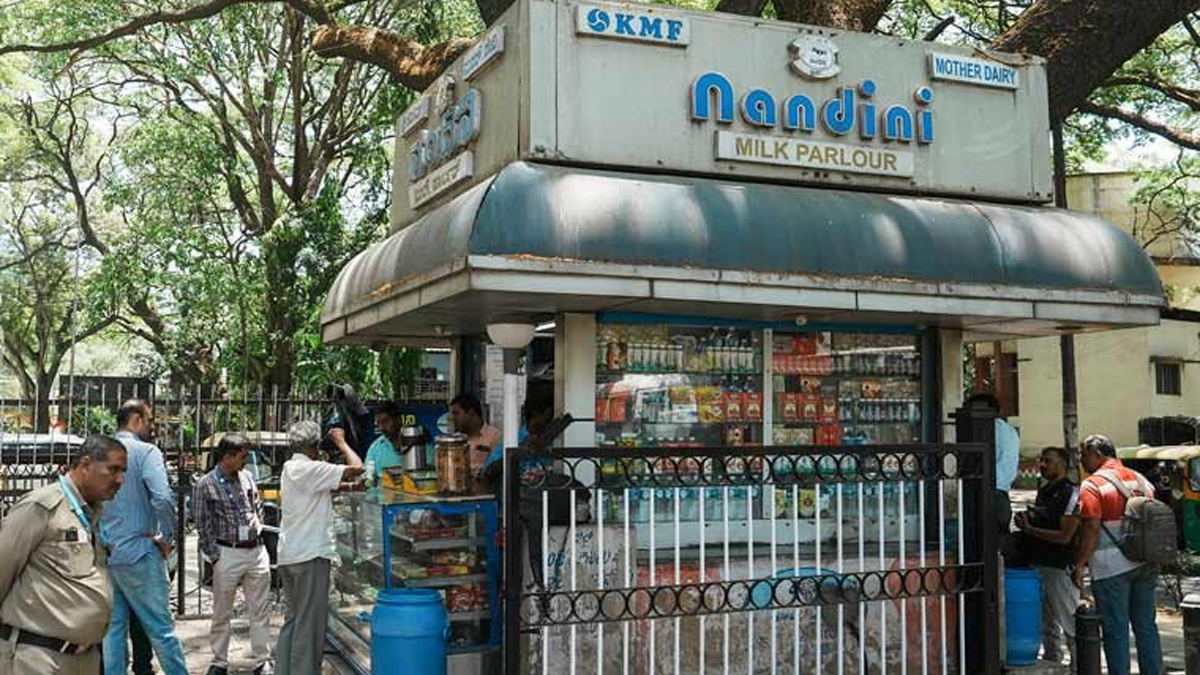Why did Bengaluru Metro allot kiosks to Amul, not Nandini at its stations?

Once again, the Karnataka government is facing the heat for sidelining home brand ‘Nandini’ and signing up Gujarat-based Amul to set up kiosks across 10 metro stations in Bengaluru. The move has been opposed by the opposition leaders who have accused the Siddaramaiah government of trying to “destroy” the home brand.
While, the political parties in the state have locked horns over ‘Nandini’ not being given its due by subsequent governments, this time, the trigger is the license agreement signed by the Bengaluru Metro Rail Corporation (BMRCL) with the Gujarat Cooperative Milk Marketing Federation (Amul) to set up retail outlets at 10 metro rail stations namely Pattandur Agrahara, Indiranagar, Benniganahalli, Byappanahalli, Trinity, Sir M Visveswaraya, Majestic, National College, Jayanagar and Banashankari.
According to a BMRCL statement, the kiosks would sell the entire range of Amul dairy products, chocolate, potato-based snacks, organic products and oil and the initiative is aimed at improving commuter convenience by providing access to trusted dairy products within Metro premises. But this move has not gone down well with netizens and the opposition parties, who are questioning the logic behind patronising Amul at the cost of Nandini.
The Janata Dal (Secular) accused the ruling Congress of “double standards”. The regional party recalled how the Congress had campaigned against Amul during the 2023 Assembly polls. JDS slammed deputy Chief Minister D.K. Shivakumar saying he had forsaken ‘Nandini’ and sold off his “self-respect” for the sake of commission.
Shivakumar, who is also the Bengaluru development minister said, “BMRCL had invited tenders and since nobody except Amul participated in the tender, they got 10 kiosks as per the agreement. I have asked KMF to bid for the kiosks.”
Shivakumar also informed that after the matter was brought to his notice, he had asked KMF to bid for eight kiosks. “Amul has already opened two kisks and we will not take them back,” said Shivakumar.
Leader of Opposition R. Ashok alleged that the Congress party had misused the Nandini brand for their electoral gains but had little commitment towards supporting the brand.
In 2022, Union Home and Cooperation Minister Amit Shah, who inaugurated the Rs 260-crore milk dairy at Mandya, promised to set up a joint Amul-Nandini primary diary in every panchayat in the state. That had led to speculations of a merger between Karnataka Milk Federation (KMF) and Gujarat-based Amul. Then opposition Congress, and also JDS, had cornered the Bommai government over its patronage of Amul and called it as an attempt to take over Nandini. Again in 2023, when Amul announced its plans to introduce fresh milk and curd in Bengaluru, it was opposed by the Congress citing the need to protect the Kannadiga-owned cooperative brand Nandini.
“The Siddaramaiah government has set out to destroy Nandini. The government is yet to pay the huge milk subsidy amount to dairy farmers. Also, the government shunted out an efficient officer (former KMF MD Jagadish) who was enthusiastic about Nandini’s new launches like the ready-made idli-dosa batter last year,” alleged Ashok.
Last December, the state BJP leaders accused the ruling Congress of yielding to pressure from private players after it deferred the launch of ‘Nandini’s – Ready to cook’ whey-based idli and dosa batter. The batter was finally launched in the same month.
The frequent political tiffs to assert Nandini’s primacy in Karnataka is not only about the Kannada pride and concerns over protecting its market share. It is no secret that the milk cooperatives wield immense political clout owing to their grassroots presence.
If Amul, started in Anand in Gujarat, is the mother of India’s cooperative movement, Nandini is Karnataka’s pride and the flagship brand of Karnataka Milk Federation (KMF), having 26,000+ dairy cooperative societies and 26 lakh dairy farmers in its network. KMF is also India's second-largest dairy cooperative after Amul. But today, the two brands find themselves often pitched against each other.
“Both Amul and Nandini are run by the farmers, one at the national level and the other in the state. We must encourage healthy competition instead of playing politics,” said BJP MLC and former BJP national general secretary C.T. Ravi.
Meanwhile, KMF managing director B. Shivaswamy said 12 Nandini outlets would come up at the Metro stations including Majestic and Cubbon Park stations. Also, KMF is negotiating for lower rental for the kiosks as the current pricing is not viable.
India